|
|
|
Sort Order |
|
|
|
Items / Page
|
|
|
|
|
|
|
| Srl | Item |
| 1 |
ID:
132902
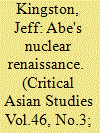

|
|
|
|
|
| Publication |
2014.
|
| Summary/Abstract |
Prime Minister Abe Shinz()'s nuclear renaissance involves downplaying risks, restarting reactors, building new ones, and exporting reactor technology and equipment. Polls in japan indicate that the public remains overwhelmingly op- posed to Abe's nuclear agenda, but in various national and local elections since late 2012 antinuclear candidates have not fared well. This article examines the disjunc-ture between public preferences and electoral outcomes and why is it likely that Japan will restart reactors despite widespread concerns about safety, the high costs of nuclear energy, and the lack of a site for permanent disposal of nuclear waste. The safety myth is being reealibrated, but the author argues that it remains based on rosy assumptions in a nation especially prone to massive seismic disasters. The reinstatement of nuclear energy in the 2014 national energy policy marks a victory for the nuclear village, a remarkable example of institutional resilience in the face of extremely adverse developments since the massive earthquake and tsunami of 1 1 March 2011 that precipitated three reactor meltdowns in Fukushima. Despite extensive revelations about shoddy safety practices in the nuclear industry and collusive relations between regulators and those they regulate, Abe has successfully promoted a nuclear revival that few would have thought possible before his election in 2012. Reactor restarts face a number of hurdles, but the pronuclear lobby now finds it has a policy opening. The summer of 2014 has been a nuclear-free one, but in all likelihood it will be Japan's last for decades to come.
|
|
|
|
|
|
|
|
|
|
|
|
|
|
|
|
| 2 |
ID:
188245


|
|
|
|
|
| Summary/Abstract |
This article shows how the international nuclear disaster in Fukushima affected the antinuclear movement in Koodankulam by using the cross-national diffusion model proposed by Kriesi, Koopmans, Duyvendak and Giugni (1995) . It examines the impact of the international disaster on the antinuclear movement and its subsequent expansion in terms of protest events and organizational trajectories. It also describes the new participants and actors in this antinuclear power issue. The research questions are addressed through archives, handbills, unpublished documents, and semi-structured interviews. I argue that diffusion of information and domestic opportunities helped the antinuclear groups erect a protest camp that offered manufactured vulnerability. This induced several meso and micro level social movement organizations and political parties to join the antinuclear movement, leading to expansion at the organizational level and the formation of coalitions. Further, the participation of newly joined social movement organizations and political parties in the mobilization helped the movement expand its protest events and led to an increase in the level of contention. The study contributes to the study of antinuclear movements and cross-national diffusion.
|
|
|
|
|
|
|
|
|
|
|
|
|
|
|
|
| 3 |
ID:
128003


|
|
|
|
|
| Publication |
2014.
|
| Summary/Abstract |
The Fukushima disaster has lead the French government to release novel cost information relative to its nuclear electricity program allowing us to compute a levelized cost. We identify a modest escalation of capital cost and a larger than expected operational cost. Under the best scenario, the cost of French nuclear power over the last four decades is View the MathML source (at 2010 prices) while in the worst case it is View the MathML source. On the basis of these findings, we estimate the future cost of nuclear power in France to be at least View the MathML source and possibly View the MathML source. A comparison with the US confirms that French nuclear electricity nevertheless remains cheaper. Comparisons with coal, natural gas and wind power are carried out to find the advantage of these.
|
|
|
|
|
|
|
|
|
|
|
|
|
|
|
|
| 4 |
ID:
115058
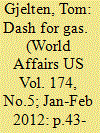

|
|
|
|
|
| Publication |
2012.
|
| Summary/Abstract |
For a fresh perspective on geopolitical trends, look at the world through the lens of the natural gas trade. One of the reasons for Israeli unease with the Arab Spring is that the democratic uprising that took down Hosni Mubarak also brought interruptions in Israel's supply of natural gas, much of which since 2008 has come from Egypt. Wondering about China's new interest in Australia and Qatar? It's about their abundant gas supplies and China's tremendous energy needs. Desperate for signs of cooperation from North Korea? Check out reports that Kim Jong-il may agree to the construction of a natural gas pipeline that would link Russia, Pyongyang, and Seoul. From Asia to the Middle East to North America, a boom in natural gas usage is rearranging international connections, with major repercussions for global politics.
|
|
|
|
|
|
|
|
|
|
|
|
|
|
|
|
| 5 |
ID:
124596
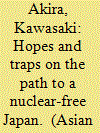

|
|
|
|
|
| Publication |
2013.
|
| Summary/Abstract |
The Fukushima nuclear disaster, which caused complex societal damage, also led to a shift in Japanese public opinion supporting the move away from nuclear power. The nuclear phaseout movement has transcended the traditional framework of Japanese social movements and has the potential to become a new force for reform. However, the Japanese nuclear phaseout is also complicated by the Liberal Democratic Party's style of rule, the link with nuclear weapons, and the relationship between Tokyo and the areas hosting the nuclear power plants. This article considers the future outlook for an energy shift and political reform in Japan with a focus on the roles of civil society and local leadership.
|
|
|
|
|
|
|
|
|
|
|
|
|
|
|
|
| 6 |
ID:
132903


|
|
|
|
|
| Publication |
2014.
|
| Summary/Abstract |
The triple disasters of 1] March 2011 in northeastern japan have exacerbated existing vulnerabilities and created new ones all over the Tohoku region. In Fukushima, the fear of radiation has been compounded by the perception of the state's failure to provide timely and relevant information to local residents. This lack of information has particularly affected one of the most vulnerable segments of the population, young mothers with children, forcing many [0 make impossible choices between supporting the economic rebuilding of their communities and protecting their children from the threat of radiation. Based on detailed ethnography and interviews conducted from just weeks after the disaster, this article discusses the ongoing struggle of women to find a place of safety and a voice of protest in the face of local and national efforts to silence their fears.
|
|
|
|
|
|
|
|
|
|
|
|
|
|
|
|
| 7 |
ID:
128005


|
|
|
|
|
| Publication |
2014.
|
| Summary/Abstract |
The Belgian nuclear phase-out law imposes closing down in the 2015-2025 period seven nuclear power plants (NPPs) producing more than 50% of the domestic electricity. This creates an urgent problem in the country because of the absence of well-defined capacity-replacement plans. Though a safety-of-supply provision in the law allows for a delayed phase-out, hopes for a technically acceptable schedule have reduced after the Fukushima nuclear disaster in March 2011. In this article policy investigations are made with system dynamics. A significant finding from such modelling is that, in contrast to common expectations, a too early nuclear phase-out will not serve the deployment of renewable energy sources and rational use of energy. It is indeed found to primarily benefit to fossil fuel, creating unwanted drawbacks regarding safety of supply, dependency on foreign suppliers, price volatility, and increased use of non-renewable and CO2-emitting fossil fuels.
|
|
|
|
|
|
|
|
|
|
|
|
|
|
|
|
| 8 |
ID:
135174
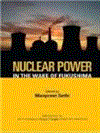

|
|
|
|
|
| Publication |
New Delhi, KW Publishers Pvt Ltd, 2012.
|
| Description |
xvii, 132p.Hbk
|
| Standard Number |
9789381904022
|
|
|
|
|
|
|
|
|
|
|
|
Copies: C:1/I:0,R:0,Q:0
Circulation
| Accession# | Call# | Current Location | Status | Policy | Location |
| 058012 | 621.4830952117/SET 058012 | Main | On Shelf | General | |
|
|
|
|
| 9 |
ID:
127294


|
|
|
|
|
| Publication |
2014.
|
| Summary/Abstract |
A nation-wide survey was conducted in 2010 to investigate the Australian public's attitudes to nuclear power in relation to climate change and in comparison to other energy alternatives. The survey showed a majority of respondents (42%) willing to accept nuclear power if it would help tackle climate change. Following the disaster at the Fukushima Daiichi Nuclear Power Complex in Japan, an event triggered by the 11 March 2011 Tohoku earthquake and tsunami, it was expected that support for nuclear power in Australia would change. In light of this, a follow-up survey was conducted in 2012. Indeed, the post-Fukushima results show a majority of respondents (40%) were not willing to accept nuclear power as an option to help tackle climate change, despite the fact that most Australians still believed nuclear power to offer a cleaner, more efficient option than coal, which currently dominates the domestic production of energy. Expanding the use of renewable energy sources (71%) remains the most popular option, followed by energy-efficient technologies (58%) and behavioural change (54%). Opposition to nuclear power will continue to be an obstacle against its future development even when posed as a viable solution to climate change.
|
|
|
|
|
|
|
|
|
|
|
|
|
|
|
|
| 10 |
ID:
107652
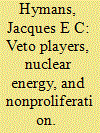

|
|
|
|
|
| Publication |
2011.
|
| Summary/Abstract |
The basic insight of the "veto players" literature from comparative politics-the more veto players, the more policy rigidity-has been nearly absent from the study of nuclear proliferation. Yet, when states need mutual agreement among a large number of veto players, this greatly lengthens the odds against radical nuclear policy change. The veto players perspective helps to explain the historical resilience of Japan's fifty-year pursuit of a complete nuclear fuel cycle for exclusively peaceful purposes. Although a long line of Japan observers have focused on statements by Japanese politicians suggesting the possibility of redirecting some of the country's large nuclear estate toward military ends, Japan's traditional nuclear policy has in fact become increasingly entrenched over the years, given the rising number of institutionalized veto players in its nuclear policymaking arena. This point is relevant not only to the long-standing question of whether Japan will acquire nuclear weapons, but also to the post-Fukushima disaster question of whether Japan will exit the nuclear field entirely.
|
|
|
|
|
|
|
|
|
|
|
|
|
|
|
|
|
|
|
|
|